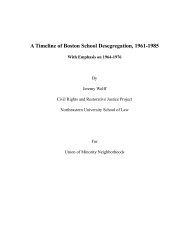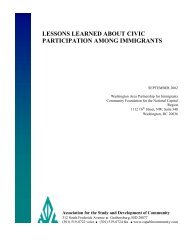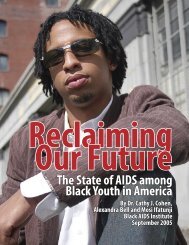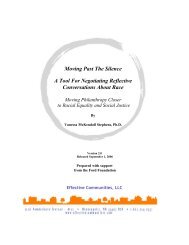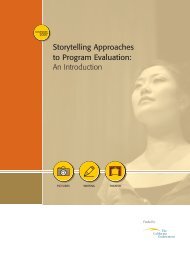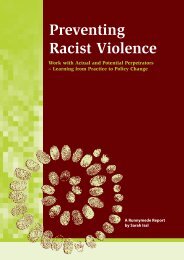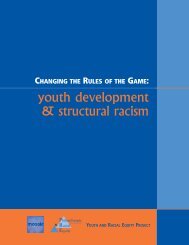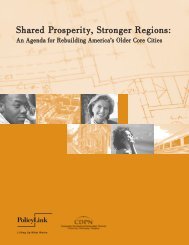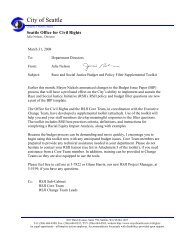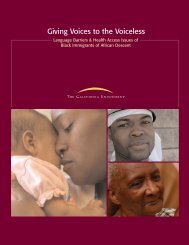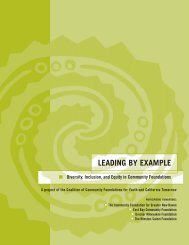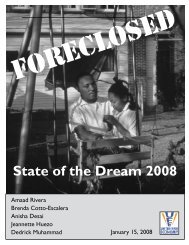to good schools, employment centers, transportationsystems, parks, grocery stores, civic <strong>in</strong>stitutions, <strong>and</strong>services are better positioned to succeed economically<strong>and</strong> socially. Because <strong>of</strong> the movement <strong>of</strong> jobs awayfrom cities, it is fundamental that transportationsystems be consciously designed to l<strong>in</strong>k low-<strong>in</strong>comecommunities to economic corridors <strong>and</strong> jobs.<strong>Leadership</strong>As the pr<strong>of</strong>iles <strong>in</strong> this report make clear, cont<strong>in</strong>u<strong>in</strong>gengagement <strong>and</strong> leadership from the philanthropiccommunity are keys to effective change. The Funders’Network <strong>and</strong> its members cont<strong>in</strong>ue to seed <strong>and</strong> promotephilanthropic <strong>and</strong> community <strong>in</strong>itiatives that <strong>in</strong>tegratethe goals <strong>of</strong> equity <strong>and</strong> smart growth. To buildunderst<strong>and</strong><strong>in</strong>g <strong>of</strong> the importance <strong>of</strong> equity-centeredsmart growth, the Network convenes leaders from arange <strong>of</strong> sectors—philanthropy, nonpr<strong>of</strong>it, academic,private, <strong>and</strong> public—at national meet<strong>in</strong>gs that serve asforums for develop<strong>in</strong>g common underst<strong>and</strong><strong>in</strong>gs aboutthe relationship between smart growth <strong>and</strong> equity.This report highlights stories drawn from the manyways <strong>in</strong> which foundations are support<strong>in</strong>g <strong>and</strong><strong>in</strong>vest<strong>in</strong>g <strong>in</strong> organizations work<strong>in</strong>g to better thequality <strong>of</strong> life <strong>of</strong> all residents by address<strong>in</strong>g l<strong>and</strong> useissues. Some <strong>of</strong> the pr<strong>of</strong>iles highlight grassrootscommunity organiz<strong>in</strong>g strategies to address issuessuch as statewide l<strong>and</strong> use policies. Other pr<strong>of</strong>ilesillustrate creative ways to m<strong>in</strong>imize the negativeimpacts <strong>of</strong> gentrification, while others focus onstrategies to merge various issues areas such astransportation, arts, social services, <strong>and</strong> hous<strong>in</strong>g toaddress social justice concerns <strong>in</strong> a more holistic way.For each story, this guide provides a short abstract, adescription <strong>of</strong> the project or organization <strong>in</strong>volved, <strong>and</strong>the results achieved. The pr<strong>of</strong>iles <strong>in</strong>cludes discussionabout why a foundation decided to fund the project <strong>and</strong>the lessons learned from the foundation’s perspective,the regional <strong>and</strong> neighborhood equity impacts <strong>of</strong> thework, <strong>and</strong> contact people for readers seek<strong>in</strong>g more<strong>in</strong>formation. Taken together, the pr<strong>of</strong>iles <strong>in</strong> this reportare designed to illustrate how strategic grantmak<strong>in</strong>g canhave a pr<strong>of</strong>ound impact on policy, plann<strong>in</strong>g, <strong>and</strong> places.A Note on the Selection ProcessThe Funders’ Network’s <strong>Regional</strong> <strong>and</strong> NeighborhoodEquity Project (RNEP) undertook an extensive selectionprocess to identify the projects pr<strong>of</strong>iled <strong>in</strong> thispublication. The process began with a list <strong>of</strong> more than70 worthwhile projects throughout the United States<strong>and</strong> Mexico (outst<strong>and</strong><strong>in</strong>g examples <strong>of</strong> regional <strong>and</strong>neighborhood equitable development strategies).Although full descriptions <strong>of</strong> each <strong>of</strong> the 70 worthwhileprojects could not be <strong>in</strong>cluded <strong>in</strong> this report, a sharplydesignedmap that identifies each <strong>of</strong> these promis<strong>in</strong>gregional <strong>and</strong> neighborhood equity efforts is <strong>in</strong>cluded atthe end <strong>of</strong> this report. The stories pr<strong>of</strong>iled <strong>in</strong> this reportprovide deeper <strong>in</strong>formation on 21 <strong>of</strong> these projects.The 70 orig<strong>in</strong>al projects were identified by theFunders’ Network, PolicyL<strong>in</strong>k, <strong>and</strong> members <strong>of</strong> theRNEP steer<strong>in</strong>g committee. In July 2004, thecommittee f<strong>in</strong>alized selection criteria for the projectsto be <strong>in</strong>cluded, as well as overall diversity criteria forthe full report. The project criteria were designed toensure that each project demonstrate one or more <strong>of</strong>the follow<strong>in</strong>g strategies:• Encourag<strong>in</strong>g collaboration across race, class, city,suburbs, <strong>and</strong>/or rural areas;• Ensur<strong>in</strong>g resident/community participation,leadership, <strong>and</strong> ownership;• Reduc<strong>in</strong>g local/regional disparities;• Connect<strong>in</strong>g people to regional opportunities;• Engag<strong>in</strong>g a mix <strong>of</strong> organizations <strong>in</strong> theimplementation;• Leverag<strong>in</strong>g government agencies;• Promot<strong>in</strong>g double bottom l<strong>in</strong>e <strong>in</strong>vestments; <strong>and</strong>/or• Promot<strong>in</strong>g equity <strong>in</strong> public <strong>in</strong>vestment.The projects were further analyzed to ensure diversityamong the pr<strong>of</strong>iles, accord<strong>in</strong>g to the follow<strong>in</strong>g criteria:• Type <strong>of</strong> project (i.e. plann<strong>in</strong>g, policy, capacitybuild<strong>in</strong>g, etc.);• Geographic location;• Foundation strategies utilized (i.e. grantmaker,convener, <strong>in</strong>vestor, etc.);• Issues addressed; <strong>and</strong>• Scale.There were many more worthy projects than could be<strong>in</strong>cluded. This report presents simply a sample <strong>of</strong> therange <strong>of</strong> <strong>in</strong>novative approaches that foundations acrossNorth America are tak<strong>in</strong>g to promote regional <strong>and</strong>neighborhood equity strategies that will create morelivable communities. The stories <strong>and</strong> resourcesdescribed <strong>in</strong> this report are designed to help <strong>in</strong>spire<strong>and</strong> <strong>in</strong>form new efforts to secure social, environmental,<strong>and</strong> economic justice <strong>in</strong> neighborhoods <strong>and</strong> regionsthroughout North America. Progress is possible, asthese creative stories illustrate.5 Funders’ Network for Smart Growth <strong>and</strong> Livable Communities
PART II:Perspectives on Advanc<strong>in</strong>g <strong>Regional</strong> <strong>and</strong> Neighborhood EquityJust years after emerg<strong>in</strong>g as a coherent concept for social<strong>and</strong> economic transformation, the regional <strong>and</strong>neighborhood equity framework is rapidly ga<strong>in</strong><strong>in</strong>gcurrency as the foundation <strong>of</strong> a burgeon<strong>in</strong>g movement.None would know better what it has taken to br<strong>in</strong>g thisevolv<strong>in</strong>g field to this po<strong>in</strong>t than those at its center.Seven leaders <strong>in</strong> the field contributed their perspectiveson the status <strong>of</strong> regional <strong>and</strong> neighborhood equity <strong>in</strong> aseries <strong>of</strong> <strong>in</strong>terviews conducted for this report.The Current SituationManuel Pastor has seen evidence <strong>of</strong> the emergence <strong>of</strong>the regional equity movement <strong>in</strong> his work as thedirector <strong>of</strong> the Center for Justice, Tolerance, <strong>and</strong>Community at the University <strong>of</strong> California, SantaCruz. “The movement is start<strong>in</strong>g to show signs <strong>of</strong>maturity. Ten years ago we saw a glimpse <strong>of</strong> policiesthat were connect<strong>in</strong>g low-<strong>in</strong>come communities toregional debates, with scattered cheerleaders for change.Now regional equity has really flowered.” AngelaGlover Blackwell, founder <strong>and</strong> CEO <strong>of</strong> PolicyL<strong>in</strong>k,agrees. “Dur<strong>in</strong>g the past five to six years there has beena conscious focus on pursu<strong>in</strong>g regional equity. Peoplehave begun to th<strong>in</strong>k <strong>of</strong> themselves as a field, broad <strong>and</strong><strong>in</strong>terconnected. Confidence is grow<strong>in</strong>g that this can bemore than fram<strong>in</strong>g <strong>and</strong> aspirations.”Myron Orfield is recognized as one <strong>of</strong> the pioneers <strong>in</strong>the use <strong>of</strong> data to demonstrate geographic <strong>in</strong>equities.As the founder <strong>and</strong> president <strong>of</strong> American Research<strong>and</strong> Geographic Information Systems (Ameregis) <strong>and</strong>author <strong>of</strong> Metropolitics: A <strong>Regional</strong> Agenda forCommunity <strong>and</strong> Stability, he has had firsth<strong>and</strong> exposureto the grow<strong>in</strong>g applicability <strong>of</strong> the regional equityanalysis. “It’s becom<strong>in</strong>g more <strong>of</strong> a broadly acceptedframe for people th<strong>in</strong>k<strong>in</strong>g about a variety <strong>of</strong>development issues. It has put civil rights on more <strong>of</strong> aregional scale.” Carl Anthony, act<strong>in</strong>g director <strong>of</strong> theCommunity <strong>and</strong> Resource Development Unit at theFord Foundation, cites more practical evidence that thefield is evolv<strong>in</strong>g. “The concept <strong>of</strong> regionalism is morepolitically viable than ever,” he notes. “Those elected <strong>in</strong>the suburbs have more <strong>of</strong> a stake <strong>in</strong> the future <strong>of</strong> theirgeography <strong>and</strong> a broader political base from which todraw.” David Rusk, consultant on urban <strong>and</strong> suburbanpolicy, author <strong>of</strong> Inside Game/Outside Game, <strong>and</strong> one <strong>of</strong>the early advocates <strong>of</strong> equity through hous<strong>in</strong>g policy,draws an even starker example <strong>of</strong> its grow<strong>in</strong>gimportance. Accord<strong>in</strong>g to Rusk, “Some <strong>of</strong> the mosttangible evidence comes from the emergence <strong>of</strong> theGamaliel Foundation as a national network <strong>of</strong> faithbasedcoalitions committed to br<strong>in</strong>g<strong>in</strong>g about regionalchanges. They can raise the moral dimensions, <strong>and</strong>perhaps more importantly, they mobilize people by thehundreds <strong>and</strong> by the thous<strong>and</strong>s on these issues. Whenthose committed members pour <strong>of</strong>f the bus, thepoliticians pay attention. That is decisive.”Blackwell po<strong>in</strong>ts out another importantdevelopment. “The past five years have witnessed areturn <strong>of</strong> well-educated planners <strong>and</strong> developers toequity work. They have been attracted by theregional framework<strong>and</strong> they have seenthat their skills <strong>and</strong>values are highlysought. There is realopportunity forleadership <strong>and</strong>mean<strong>in</strong>gful work.”The ChallengeAheadAs with any emergentmovement, myriadchallenges must befaced. Pastor observes,“To be effective,“The past five years havewitnessed a return <strong>of</strong> welleducatedplanners <strong>and</strong>developers to equity work.They have been attractedby the regional framework<strong>and</strong> they have seen thattheir skills <strong>and</strong> values arehighly sought. There is realopportunity for leadership<strong>and</strong> mean<strong>in</strong>gful work.”—Angela Glover Blackwellcommunity-based organizations now have to underst<strong>and</strong>complex transportation <strong>and</strong> affordable hous<strong>in</strong>g issues.Beyond mak<strong>in</strong>g projects work politically, they have toknow how they pencil out. You have to underst<strong>and</strong> youreconomic context.” Nor is the path to equitabledevelopment unimpeded. “This work is com<strong>in</strong>gtogether <strong>in</strong> the face <strong>of</strong> some <strong>of</strong> the most entrenchedforces <strong>in</strong> society,” notes Blackwell. “Resistant developers,homeowners, local elected <strong>of</strong>ficials suspicious <strong>of</strong> anyregional agenda—even straight prejudice. Overcom<strong>in</strong>gthose forces is the next push. We are not naïve about thechallenge this presents. It will take political will <strong>and</strong>authentic alliances.”Ben Starrett agrees. As executive director <strong>of</strong> theFunders’ Network for Smart Growth <strong>and</strong> LivablePart II: Perspectives on Advanc<strong>in</strong>g <strong>Regional</strong> <strong>and</strong> Neighborhood Equity6
- Page 1 and 2: Stories of Philanthropic Leadership
- Page 3 and 4: Signs of Promise:Stories of Philant
- Page 5 and 6: Funders’ Network for Smart Growth
- Page 7 and 8: (II. B.)(II. C.)Turning Neighborhoo
- Page 9 and 10: PART I:IntroductionThe Purpose of t
- Page 11: social justice issues as they relat
- Page 15 and 16: peer work, we can reestablish a sig
- Page 17 and 18: Annie E. Casey FoundationBaltimore,
- Page 19 and 20: neighborhoods into healthy ones—g
- Page 21 and 22: Charles and Helen Schwab Foundation
- Page 23 and 24: Section 1:Promoting Equitable Publi
- Page 25 and 26: I. A. BUILDING POWER AND GIVINGVOIC
- Page 27 and 28: policy advocates. In 2002, Milwauke
- Page 29 and 30: in Los Angeles, Ford’s Anthony no
- Page 31 and 32: I. B. PROMOTING COALITIONSTO ADVANC
- Page 33 and 34: Yet the interpersonal dynamics of c
- Page 35 and 36: guidelines. “Many of the member o
- Page 37 and 38: Funder InterestThe EPA supported th
- Page 39 and 40: I. D. DEMONSTRATING THESTRUGGLE FOR
- Page 41 and 42: Richmond, Calif.The second regional
- Page 43 and 44: through policy reform at the local
- Page 45 and 46: I. E. BUILDING COALITIONTHROUGH KNO
- Page 47 and 48: organizing project, the Connecticut
- Page 49 and 50: and businesses are quantified in a
- Page 51 and 52: I. G. REVITALIZING WHILEASSURING DI
- Page 53 and 54: In the late 1990s, the city of Albu
- Page 55 and 56: I. H. A TRAVEZ DE LA FRONTERA:LAND
- Page 57 and 58: The International Community Foundat
- Page 59 and 60: I. I. MOBILIZING ACTION FORREGIONAL
- Page 61 and 62: To meet all of these objectives, th
- Page 63 and 64:
efforts. And with each public plann
- Page 65 and 66:
pattern of disproportionate transpo
- Page 67 and 68:
Clinica de la Raza identify this cr
- Page 69 and 70:
Contact PeopleCarl AnthonyActing Di
- Page 71 and 72:
Section 2:Making All Neighborhoods
- Page 73 and 74:
II. A. REACHING BEYONDHOUSING TO IM
- Page 75 and 76:
A local resident receives the keys
- Page 77 and 78:
East Baltimore community and the Jo
- Page 79 and 80:
example, adjacent to the EBDI area,
- Page 81 and 82:
II. C. YIELDING REGIONALBENEFITS TH
- Page 83 and 84:
is using transit-oriented developme
- Page 85 and 86:
financing and innovative, forward-t
- Page 87 and 88:
The Row House Community Development
- Page 89 and 90:
II. E. COUNTERING THE PERFECTSTORM:
- Page 91 and 92:
funded community programs, includin
- Page 93 and 94:
housing developments and commercial
- Page 95 and 96:
owned enterprises, totaling $8.5 mi
- Page 97 and 98:
LOAN GUARANTEESSection 3:Connecting
- Page 99 and 100:
III. A. MAKING HOUSING ANOPPORTUNIT
- Page 101 and 102:
A new report from the National Hous
- Page 103 and 104:
The Straphangers Campaign was found
- Page 105 and 106:
Funder InterestThe Straphangers Cam
- Page 107 and 108:
or increase poverty. Whether direct
- Page 109 and 110:
The Regional Plan Association then
- Page 111 and 112:
multi-stakeholder effort composed o
- Page 113 and 114:
director with LISC. No one set of s
- Page 115 and 116:
12 western Louisville neighborhoods
- Page 117 and 118:
III. E. UNITING THREE STATESFOR ONE
- Page 119 and 120:
increased their personal wealth by
- Page 121 and 122:
summary evaluation of MSDI found th
- Page 123 and 124:
method alone was strong enough to m
- Page 125 and 126:
consistent body of work. The Counci
- Page 127 and 128:
3) Issues Need to be ConnectedThe f
- Page 129 and 130:
PART V:Glossary of TermsThe terms d
- Page 131 and 132:
Regional and neighborhood equity. A
- Page 133 and 134:
Tijuana River Reserve, California:h
- Page 135 and 136:
Sargent Shriver National Center on
- Page 137:
1500 San Remo Avenue • Suite 249



